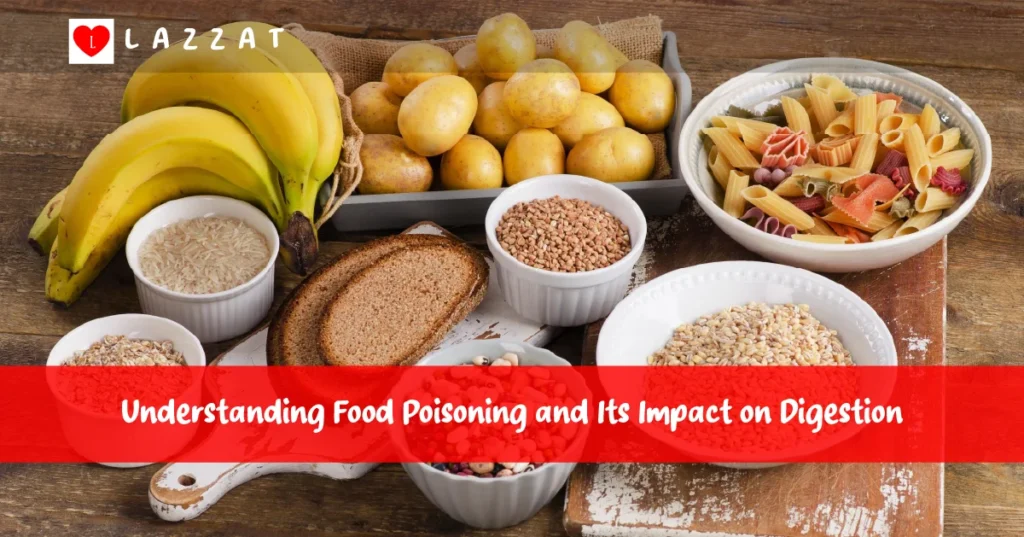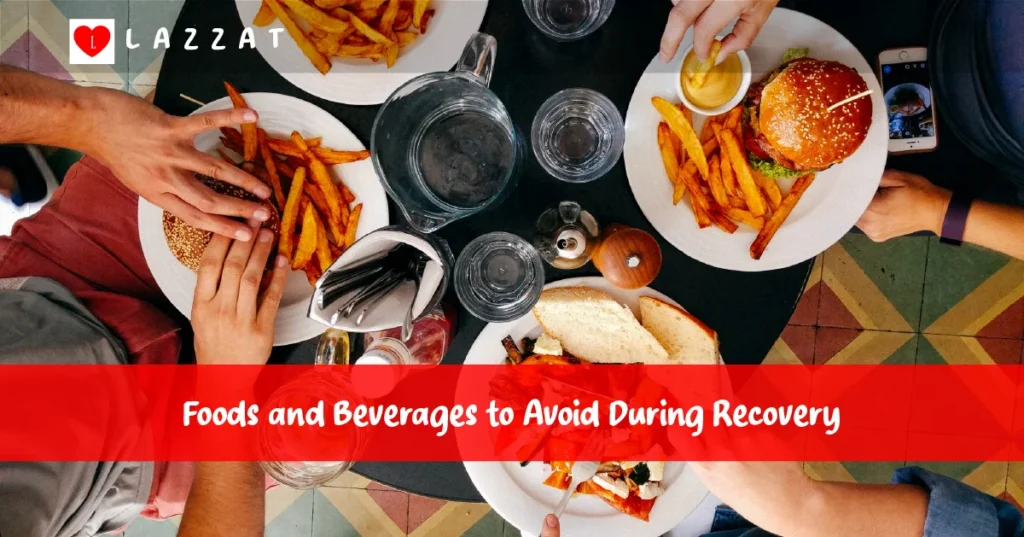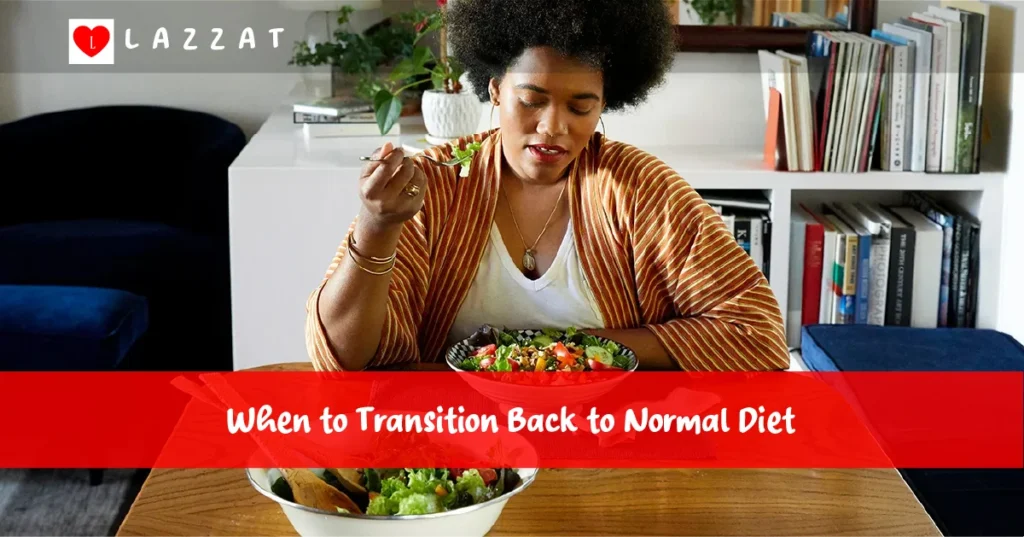What to Eat and Drink After Food Poisoning: Special Diet
- mylazzat
- Eat and Drink, Food Poisoning
- 0 Comments
Ever felt the nasty effects of food poisoning? Getting better from it is tricky, and what you eat and drink matters a lot. This guide will show you the key foods and drinks to help you feel better and get your digestive system back on track.
Table of Contents
Understanding Food Poisoning and Its Impact on Digestion
Food poisoning is a common issue that can upset your stomach. Knowing the symptoms, how long it takes to get better, and its effects on your body is key. This knowledge helps you recover faster.
Common Symptoms and Recovery Timeline
Food poisoning symptoms include nausea, vomiting, diarrhea, stomach pain, and fever. These signs usually show up 1-3 days after eating bad food or drinks. Most people start feeling better in 1-2 days, and it can take up to a week to fully recover.
How Food Poisoning Affects Your Digestive System
When harmful germs get into your stomach, it can cause inflammation and upset. This messes with the balance of good and bad bacteria in your gut. Your body might have trouble digesting food and absorbing nutrients, making you feel even worse.
| Digestive System Impact | Potential Consequences |
|---|---|
| Inflammation of the gastrointestinal tract | Increased risk of diarrhea, vomiting, and abdominal pain |
| Disruption of gut microbiome | Difficulty in nutrient absorption and prolonged digestive issues |
| Dehydration and electrolyte imbalance | Fatigue, muscle cramps, and other health concerns |
It’s important to understand how food poisoning affects your stomach. By knowing this, you can make better choices about what you eat and how to help your body heal. This way, you can get through the recovery process more smoothly.

What to Eat and Drink After Food Poisoning
After food poisoning, it’s important to eat gently to recover. Your stomach needs time to heal. So, start with small, easy steps to get better.
Let’s look at the best recovery foods and safe beverages to help you feel strong again.
Hydration is Key
First, drink plenty of water to rehydrate. Choose safe beverages like water, electrolyte drinks, and diluted fruit juices. Stay away from caffeinated or alcoholic drinks, as they can dry you out.
Drink these fluids slowly all day. This helps your body adjust without shock.
Gentle, Easily Digestible Foods
The BRAT diet (Bananas, Rice, Applesauce, Toast) is a good start for your post-food poisoning diet. These foods are easy on your stomach and help calm your digestive system. As you get better, add other recovery foods like cooked veggies, plain yogurt, and lean proteins.
| Recommended Foods | Foods to Avoid |
|---|---|
| BananasRiceApplesauceToastCooked vegetablesPlain yogurtLean proteins | Spicy, fried, or fatty foodsDairy products (except for plain yogurt)Caffeinated or alcoholic beveragesRaw vegetables or fruitsNuts, seeds, and high-fiber foods |
Listen to your body and slowly add foods back into your diet. With patience and care, you’ll be back to normal eating soon.
The Importance of Hydration and Electrolyte Balance
Keeping your body hydrated and balanced with electrolytes is key after food poisoning. Vomiting and diarrhea can quickly lead to dehydration. This loss of minerals like sodium, potassium, and chloride is dangerous. It’s important to replace these electrolytes to help your body heal.
Best Rehydration Solutions
Drinking lots of water is the best way to rehydrate. It’s better to sip small amounts often than drink a lot at once. You can also use sports drinks with added electrolytes to speed up rehydration.
- Water: Aim for at least 8 cups (64 ounces) of water per day, or more if you’re experiencing significant fluid loss.
- Sports drinks: Look for options that contain a balance of electrolytes like sodium and potassium to help replenish what you’ve lost.
Signs of Dehydration to Watch For
Knowing the signs of dehydration is crucial. Look out for:
- Dry mouth and tongue
- Fatigue and dizziness
- Decreased urine output or dark yellow urine
- Rapid heart rate
When to Use Sports Drinks vs. Water
If you’re dehydrated but not severely, sports drinks might be better than water. They have electrolytes that help your body hold onto fluids. But for mild dehydration, water is enough for rehydration.

BRAT Diet: Your Recovery Foundation
When you’re recovering from food poisoning, the BRAT diet is a top choice. BRAT stands for Bananas, Rice, Applesauce, and Toast. It’s a simple plan that helps ease your digestive system and gets you back to normal.
The BRAT diet is gentle on your stomach and intestines. It offers easy-to-digest nutrients to replace what’s lost. These foods are low in fiber, which is good for your digestive system after food poisoning.
- Bananas are full of potassium, an electrolyte lost through vomiting or diarrhea. They also have pectin, a fiber that helps firm up loose stools.
- Rice is a bland, starchy food that’s easy to digest. It helps bind the stool, making bowel movements less frequent.
- Applesauce is a low-fiber option that helps restore nutrients. It also soothes your digestive tract with its gentle texture.
- Toast is a simple, easy-to-digest food. It helps settle your stomach and gives you a bit of energy without overwhelming you.
By sticking to the BRAT diet, you give your digestive system a break. As you recover from food poisoning, you can slowly add more complex foods back into your diet.
Easily Digestible Foods to Speed Up Recovery
After food poisoning, it’s key to eat foods that are easy on your stomach. These foods help soothe your digestive system and aid in quick recovery. Adding these gentle, nutrient-rich foods to your diet nourishes your body without stressing your digestive system.
Clear Broths and Soups
Clear broths and soups are great for recovery. They are easy on your stomach and keep you hydrated. Choose soups made with simple ingredients like chicken, veggies, or bone broth. Stay away from creamy soups that are harder to digest.
Plain Crackers and Toast
Plain, unsalted crackers and well-toasted bread are gentle on your stomach. They help absorb stomach acid and offer a comforting texture. Avoid seasoned, buttery, or fried options as they are harder to digest.
Gentle Protein Options
- Boiled or poached eggs: A source of high-quality protein that’s easy to digest.
- Lean white meat: Chicken or turkey, prepared in a simple, non-fried manner.
- Cooked, flaked fish: Opt for mild, low-mercury varieties like cod or tilapia.
- Smooth nut butters: A small amount of peanut or almond butter can provide protein without straining your digestive system.
By adding these easily digestible foods to your diet after food poisoning, you support your body’s healing. This helps restore your digestive health faster.
Foods and Beverages to Avoid During Recovery
When you’re getting better from food poisoning, it’s important to watch what you eat and drink. Some foods and drinks can make your symptoms worse or slow down healing. Let’s look at what you should avoid during this time.
Trigger Foods to Avoid
It’s best to stay away from foods that can make your stomach upset or inflamed. These include:
- Fried and greasy foods
- Spicy dishes
- Dairy products, such as milk, cheese, and ice cream
- Caffeinated beverages like coffee, tea, and soda
- Alcohol
- Raw fruits and vegetables with high fiber content
These trigger foods can make your stomach worse and slow down recovery. It’s important to avoid them until your body heals.
Potential Dietary Restrictions
You might need to eat less or differently based on how bad your food poisoning is. This could mean:
- Only drinking clear liquids, like broth, tea, and electrolyte-rich drinks
- Slowly adding bland foods like bananas, rice, applesauce, and toast
- Not eating foods high in fiber that can irritate your stomach
By following these dietary restrictions, you help your body recover and get back to normal.
| Foods to Avoid | Reason |
|---|---|
| Fried and Greasy Foods | Can further upset the digestive system and slow down recovery |
| Spicy Dishes | May cause irritation and inflammation in the gastrointestinal tract |
| Dairy Products | Can be difficult to digest and may exacerbate symptoms |
| Caffeinated Beverages | Can have a diuretic effect, leading to further dehydration |
| Alcohol | Can irritate the digestive system and slow down the healing process |
| High-Fiber Raw Fruits and Vegetables | May be difficult to digest and can further upset the digestive system |
By avoiding these foods to avoid and eating soft, easy foods, you help your body heal. This way, you can fully recover from food poisoning.

Natural Remedies and Healing Foods
When you’re recovering from food poisoning, natural remedies and healing foods can help a lot. Ginger and peppermint are two great choices. They can ease your digestive discomfort and help your gut health.
Ginger and Peppermint Benefits
Ginger is known for its anti-inflammatory effects. It can help with stomach aches and nausea from food poisoning. It also helps relax the intestines and get rid of gas.
Peppermint, on the other hand, is a natural relaxer for the stomach. It can calm down the stomach and reduce cramps.
Probiotic-Rich Options
Probiotics, or “good” bacteria, are key in fixing your gut after food poisoning. Foods like probiotic yogurt, kefir, or probiotic supplements are full of these helpful bacteria. They can reduce inflammation, improve digestion, and boost your immune system.
Adding these natural remedies and healing foods to your diet can help your body recover faster. It makes your way back to good health smoother and more comfortable.
When to Transition Back to Normal Diet
Recovering from food poisoning means slowly getting back to eating like you normally do. How and when you start eating again is very important. It can affect how well you recover and how you feel.
First, listen to what your body is telling you. The time it takes to get better can vary based on how bad your symptoms were. Usually, it’s best to start adding foods back into your diet when your stomach feels better. This is usually in 1-2 weeks.
- Begin with foods that are easy to digest, like plain rice, toast, and bananas. Then, add foods that are more complex and have more fiber as you get better.
- Watch for any stomach problems or changes in how you go to the bathroom. These signs mean your body might not be ready for a full return to your usual diet.
- Don’t rush back to your usual diet too quickly. Doing so can make recovery take longer.
Being patient and flexible is key when getting back to your usual diet. Your body has been through a lot, and it needs time to get strong again. By listening to your body and slowly getting back to your usual eating, you can make your recovery smoother and more lasting.
| Milestone | Recommended Action |
|---|---|
| 1-2 weeks after onset | Start with bland, easily digestible foods |
| 2-4 weeks after onset | Gradually reintroduce more complex and fiber-rich foods |
| 4-6 weeks after onset | Resume normal diet, while monitoring for any lingering digestive issues |
“Listening to your body’s signals and transitioning back to your normal diet at a pace that feels comfortable is crucial for a successful recovery from food poisoning.”

Conclusion
Proper nutrition and hydration are key to getting better from food poisoning. The BRAT diet and easily digestible foods help your digestive system. Staying hydrated is also important.When you feel better, start eating your usual foods again. But, avoid foods that might upset your stomach at first.
Keeping your digestive health in check is important, even after food poisoning. Eating probiotic-rich foods and staying hydrated helps. Being careful about what you eat also helps.With these tips, you can regain your energy and health. You’ll be able to enjoy your favorite foods again without worry.
Your body can bounce back from food poisoning with the right care. Focus on your digestive health for a full recovery and a healthier future.
Please Also Read:
FAQs
What should I eat after food poisoning?
After food poisoning, stick to bland, easy-to-digest foods like bananas, rice, applesauce, and toast. As your symptoms improve, gradually introduce other gentle foods like cooked vegetables and lean proteins.
How can I rehydrate after food poisoning?
To rehydrate, drink plenty of water and electrolyte-rich fluids like sports drinks. Avoid caffeinated and alcoholic beverages, as they can worsen dehydration.
Can I eat yogurt after food poisoning?
Plain yogurt can be beneficial as it contains probiotics, which can help restore gut health. However, avoid yogurt with added sugars or flavors, as they may irritate your stomach.
How long does it take to recover from food poisoning?
Most people recover from food poisoning within a few days. However, the recovery time can vary depending on the severity of the infection.
What foods should I avoid after food poisoning?
During recovery, avoid spicy foods, fatty foods, dairy products, and highly processed foods. These foods can irritate your digestive system and worsen your symptoms.
